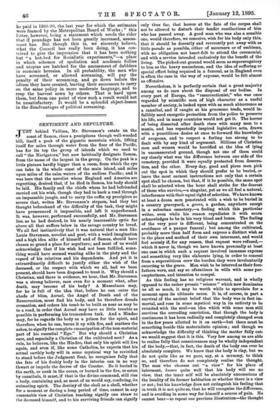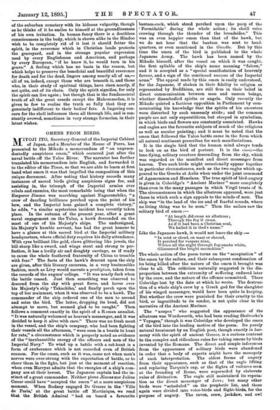SENTIMENT AND SEP17LTURE.
JUST behind Vailima, Mr. Stevenson's estate on the coast of Samoa, rises a precipitous though well-wooded hill, itself a peak of the gigantic mountain which, lifting itself for miles through water from the floor of the Pacific, has for its top the group of islands which we used to call "the Navigators," but now habitually designate Samoa, from the name of the largest in the group. On the peak is a little plateau hardly bigger than a room, from which the eye can take in the whole coast of the main island, and miles upon miles of the calm waters of the endless Pacific; and it was here that the novelist whom England and America are regretting, desired that, if he died in Samoa, his body should be laid. His family and the chiefs whom he had befriended carried out his wish, though they had to hack a road through an impassable jungle, and to carry the coffin up precipices so severe that, writes Mr. Stevenson's stepson, had they but thought beforehand of the difficulty of the task, they might have pronounced it impossible, and left it unperformed. It was, however, performed successfully, and Mr. Stevenson lies, as he had desired, in his nearly inaccessible eyrie far above all that suffers below in the savage country he loved. We all feel instinctively that it was natural that a man like Louis Stevenson, novelist and poet, with a weird imagination and a high idea alike of himself and of Samoa, should have chosen so grand a place for sepulture; and most of us would acknowledge that if his wish had not been fulfilled, some- thing would have seemed wanting alike in the piety and the regard of his relatives and his dependents. And yet it is extraordinarily difficult to justify either the wish of the deceased, or the respect with which we all, had we been present, should have been disposed to treat it. Why should a Christian, and there is evidence, we hear, that Mr. Stevenson was a strong believer, care even for a moment what, after death, may become of his body ? A Mussulman may, for he is full of the idea that, before he can enter the abode of bliss, Azrael, the Angel of Death and of the Resurrection, must find his body, and he therefore dreads cremation, and orders his tomb to be built as near as may be to a road, in order that Azrael may have as little trouble as possible in performing his tremendous task. And a Hindoo may, for he regards the body as a prison for the spirit, and therefore, when he can, burns it up with fire, and scatters the
ashes, to signify the complete emancipation of the non-material part of his essential "Ego." But why should a Christian care, and especially a Christian of the cultivated sort As a rule, he believes, like the Hindoo, that only his spirit will live again, and even if, like some Catholics, he expects that his actual earthly body will in some mystical way be revivified to stand before the Judgment Seat, he recognises fully that the fate of his fleshly body in the interim can in no way thwart or impede the decree of the Creator. Be it buried in the earth, or sunk in the ocean, or burned in the fire, or eaten by cannibals, it must, if that is the divine command, still rise a body, containing and, as most of us would say, confining, its animating spirit. The destiny of the shell as a shell, whether for a moment or during a long period of time, cannot in any reasonable view of Christian teaching signify one straw to the deceased himself, and to his surviving friends can signify only thus far, that horror at the fate of the corpse shall not be allowed to disturb their tender recollections of him who has passed away. A good man who was also a sensible one, would therefore, we conceive, wish for his body only this, that it should be decently and reverently put away with as little parade as possible, either of mourners or of emblems, with no obligation not heart-felt to attend the ceremonial, and with a service intended exclusively for the benefit of the living. The picked-out ground would seem as supererogatory to him as the heavy mausoleum, and the idea of suffering or special effort being required in a funeral, as in England even is often the case in the way of expense, would be felt almost as offensive.
Nevertheless, it is perfectly certain that a great majority among us do care about the disposal of our bodies. In every part of Europe, the "resurrectionist," who was once regarded by scientific men of high character as a useful member of society, is looked upon with as much abhorrence as a cannibal, and if caught at his gruesome trade, would in- fallibly need energetic protection from the police to preserve his life, and in many countries would not get it. The horror of being dissected after death rises with many men to a mania, and has repeatedly inspired legislative acts, drawn with a punctilious desire at once to forward the knowledge of surgeons, and to respect a. feeling too strong to be dealt with by any kind of argument. Millions of Christian men and women would be horrified at the idea of lying in unconsecrated ground, though not one of them could say clearly what was the difference between one side of the cemetery, provided it were equally protected from desecra- tion, and the other. Every day, good and pious men pick out the spot in which they should prefer to be buried, or leave the most earnest instructions not only that a certain spot shall be chosen, but that, if it be possible, the same spot shall be selected when the hour shall strike for the dearest of those who survive,—a singular, yet as we all feel a natural, interference with their equal right of selection. We have known at least a dozen men penetrated with a wish to be buried in a country graveyard, a grove, a garden, anywhere except in a suburban cemetery,—a feeling which this particular writer, even while his reason repudiates it with scorn acknowledges to be in his very blood and bones. The feeling of the very poor is different, being concentrated on the avoidance of a pauper funeral; but among the cultivated, probably more than half form and express a distinct wish as to the place and method of their own interment, and would feel acutely if, for any reason, that request were refused,— which it never is, though we have known personally at least one ease in which such a request involved immense expense and something very like elaborate lying, in order to conceal from a superstitious crew the burden they were involuntarily escorting to the grave. Men wish to be interred as their fore- fathers were, and say so oftentimes in wills with some per- emptoriness, and intention to compel.
As this feeling has no religious warrant, and is wholly opposed to the rather prosaic " science " which now dominates us all so much, it may be worth while to speculate for a moment upon its ultimate cause. It is, of course, in part a survival of the ancient belief that the body was in fact im- mortal, and rose in some mystical way in its entirety to be reunited with the soul—an idea which with some men still survives the corroding conviction, that though the body is continuous it has heen radically and completely changed even in the few years allotted to it on earth—but there must be something beside this materialistic opinion ; and though we acknowledge the difficulty of thinking the matter fully out, we would suggest that it is this. Very few among us are able to realise frilly that consciousness may be wholly independent of the body,—that, in fact, the death of the body can ever be absolutely complete. We know that the body is clay, but we do not quite like as we gaze, say, at a mummy, to think so, and therefore do not completely realise the thought.
The man who chooses out "a view" for his place of interment, knows quite well that his body will see no view, that the inner self will be absolutely unconscious of the locality of its former habitation or whether there is a view or not; but his knowledge does not extinguish his feeling that in truth it is not quite so, that he will recognise the difference, and is avoiding in some way for himself a source of pain. He cannot bear—to repeat our previous illustration—the thought
of the suburban cemetery with its hideous vulgarity, though as he thinks of it he smiles to himself at the groundlessness of his own irritation. In human fancy there is a deathless consciousness in the body, which is shown alike in the Hindoo wish to be completely rid of it lest it should fetter the spirit, in the reverence which in Christian lands protects the graveyard, and in the strange popular expression used by every Englishman and American, and perhaps by every European, "if he knew it, he would turn in his grave." A feeling which has no basis in the reason, but which helps to preserve the beneficial and beautiful reverence for death and for the dead, lingers among nearly all of us,— all of us, indeed, except those who are beneath it, and those who, in their study of spiritual things, have risen nearly, if not quite, out of its chain. Only the spirit signifies, for only the spirit can live again ; but though that is the fundamental truth of all the great creeds except the Mahommedan, it is given to few to realise the truth so fully that they are genuinely indifferent to their bodies' fate. A lingering con- cern for the shell influences them all through life, and is con- stantly avowed, sometimes in very strange formulas, in their latest wishes.



































 Previous page
Previous page